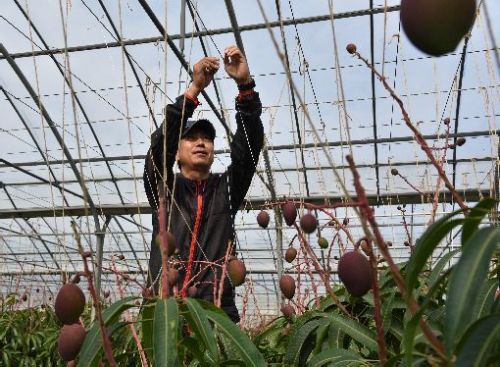As Okinawan mangoes and pineapples begin to ripen, a call goes out for locals to consume the harvest to overcome the headwinds created by the coronavirus

Photograph: Masaaki Kagemitsu from Nakamano Orchard caring for his mangoes in preparation for the June harvest - May 1, Ginoza
May 5, 2020 Ryukyu Shimpo
By Erina Ishii
Okinawan mangoes and pineapples are popular all throughout Japan as high-class gifts. However, as the coronavirus pandemic will now extend later into the year, anxieties have arisen around slumping sales in the summer. Farmers, who would normally be preparing their produce for shipping around Golden Week, are now gripped with uncertainty about the future, and are saying, “It would be great if Okinawans would consume these fine Okinawan products.”
Okinawa, with a hot and tropical climate, is at the northern limit where mangoes and pineapples can be naturally cultivated, making the island chain the top producer of the fruits in Japan. Pineapples peak right around the opening of Golden Week, and mangoes reach the height of their demand in July, around the time of the Bon festival.
The sweet gold barrel pineapple, which was developed for canning, has grown in popularity and increased in price, and has seen an increase of shipments made for raw consumption.
Okinawan mangoes meanwhile experience stiff competition from Miyazaki prefecture, where they are also produced. Hidekatsu Henzan, head of JA Okinawa’s agricultural sales division stressed, “Okinawan grown mangoes are filling, and have a good balance of sugar and acidity. The taste of fruit from trees are unsurpassed anywhere.”
Okinawan-grown fruits are often sought after as gifts, and are highly popular with tourists, and outside of the prefecture one fruit will often sell for thousands of yen. However, due to the coronavirus pandemic, sales of high-class goods have been low, and low sales figures and price drops are expected for these fruits as well.
Unlike overseas produce, which is harvested before ripening in order to take into account the time for transport overseas on ships, Okinawan mangoes and pineapples can hit the market at their sweetest when they are ripe. Since they can be harvested ripe, and shipped domestically by air while still fresh, the value of Okinawan brands has risen. Henzan says, “Any way you look at it, being able to harvest the fruit ripe is a big merit in favor of Okinawan fruit.”
However, with airlines having to suspend or reduce flights due to the pandemic, there are concerns about difficulties with being able to ship fruits from Okinawa to the rest of Japan.
Nakamano Orchard (Ginoza), which grows mangoes and pineapples, online orders make up a lot of their sales outside Okinawa. Masaaki Kagemitsu, who works at the orchard, says bleakly, “We can do refrigerated shipping outside of Okinawa, but we have concerns about logistics from here on. The business on the streets and stations that drive the tourist demand have also closed due to the virus.”
With mainland distribution slowing, JA Okinawa is looking to bolster sales within Okinawa. They started taking orders in Okinawa at the end of April, slightly earlier than they would for elsewhere in Japan. However, with the prospect of things like sales promotions at retail locations becoming murky, there is a limit to their chances for driving appeal in Okinawa.
Kagemitsu is hard at work growing mangoes with an eye towards the June harvest. “I want to offer a food that makes people happy when they eat it. I want [farmers] to put our strength together to overcome this.”
(English translation by T&CT and Sam Grieb)
Previous Article:Editorial: Safeguarding democracy in a pandemic surveillance state
Next Article:Ninth Circuit deems DOD judgment “reasonable” in possible final ruling of “dugong case”
[Similar Articles]
- 1,000 Mangoes on one tree at Higa’s Farm in Nakijin!
- Okinawa Prefectural Government produces new Okinawan mangoes
- Refreshing! Time to Harvest Unripe Shikuwasa
- Mangos from Okinawa get priced at 150000 yen in Tokyo
- Passion fruits waiting for shipment
 Webcam(Kokusai Street)
Webcam(Kokusai Street)


